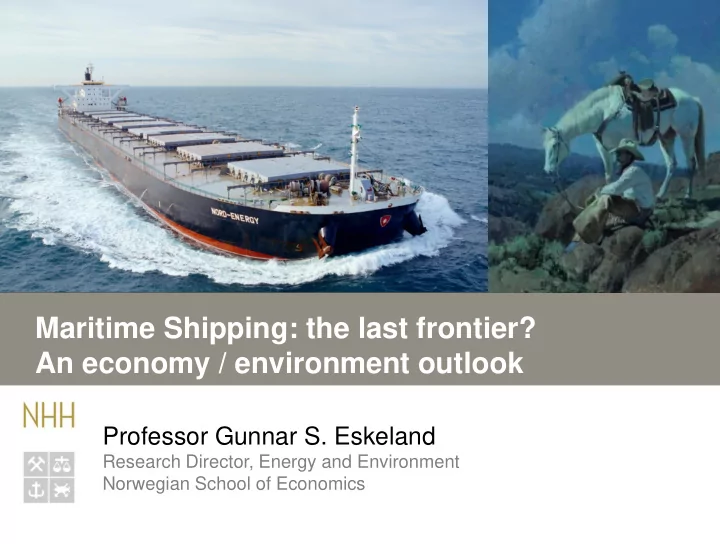

Maritime Shipping: the last frontier? An economy / environment outlook Professor Gunnar S. Eskeland Research Director, Energy and Environment Norwegian School of Economics
AGENDA Mare libre: unruly frontiersman or well behaved servant? An outlook that is uncertain but with certain implications How we operate our ships is of utmost importance Sector defends role, delivers on evnvironment
An old problem: Find better means of transporting yourself between meaningful places…
Stretch a keel and go where it is flat…
Today, these facts prevail: • Maritime transport is the cheapest – Most efficient – Including energy efficient, emission efficient • After Malthus, Limits to growth, Exxon Valdez and compelling climate change, maritime transport is – Still competitive, – requires the same skills, – capital, technology, – incentive systems – Well, hear me out …
Outlook: World economy 2013 to 14: from 3 to 3 3/4 % p a
Where are we? Drybulk shipping • Large expansion of coal/iron ore mines underway – 10-12% p.a. export growth possible – China running out of high- grade, low-cost iron ore – Domestic Chinese production replaced by imports • Renewed optimism – Has generated substantial new ordering in 2013 – Orderbook back to 18% of fleet – May cap upside in light of still substantial overcapacity of ships (approx 25%) Current: Weak Expected: Improving
Where are we? Product tankers • US exports of refined oil products strong – Increasing domestic crude production, decreasing consumption of products – Surplus exported • New refining capacity in the Middle East – Refined products exports rather than crude (added value) • But modern refineries are more flexible – Can adapt faster to local Current: Below average demand Expected: Stronger
Where are we? Crude oil tankers • Changes in the US – Increasing domestic production – Decreasing domestic consumption – Lower imports, particularly long haul – bad for tankers • OECD consumption back at 1995 levels – Only (European) economic conditions or a more fundamental shift in energy mix? • Demand growth only from Current: Weak emerging economies – Increasing risk Expected: Weak
General theme • Macro-economic outlook globally not especially bright • Two possible ‘ locomotives ’, China and US, uncertain both with respect to growth and bulk trade generation potential (structure) • Newbuilding despite fleet capacity reflects yard capacity more than long term substantial need • = > tech revolution will not come fast
Our studies: Reducing speed and emissions • Easiest way to lower fuel consumption is to reduce speed • Hull & propulsion system is designed for a particular speed & loading condition – Actual operating profile may be very different – suboptimal operation • External limits on speed – Engine limitations (Maximum Continuous Rating, MCR) – Minimum steering speed – Engine fouling at continuous low engine ratings – Charter party clauses
Optimal speed vs. market conditions • Goal: Maximise $/day profit (owners) or minimise $/tonne cost (charterers) – both give same result • Key assumption: No expected change in rates and fuel prices • What matters is the ratio between the fuel price and the $/tonne freight rate – not absolute levels Bunkers/ spot rate price ratio
Starting point: Map the status quo • In order to assess operational efficiency we need to know what ships are actually doing over time • Example: trans-Atlantic Capesize bulker speeds since mid- 2011 15.00 Actual TA speed Owners stick to slow- 14.00 Theoretical optimum steaming also when it 13.00 would be optimal to speed up 12.00 11.00 Are there organisational 10.00 and contractual issues that prevent efficient 9.00 01/07/2011 01/08/2011 01/09/2011 01/10/2011 01/11/2011 01/12/2011 01/01/2012 01/02/2012 01/03/2012 01/04/2012 01/05/2012 01/06/2012 01/07/2012 01/08/2012 01/09/2012 01/10/2012 01/11/2012 01/12/2012 operation?
Unusual: Low freight markets, high bunker (energy) prices. Get used to it?
Our study of speeds: AG VLCC • What we expected:
We found: Speed optimization ‘missing in action’
Future work remains but • Slower speeds can reduce emissions, without new regulations, engines, hulls, prop’n technologies • Example: – reduce speeds by 20% (from around 12 to 10 knots) – Bunker consumption &emissions per day down by 50% – Output per day (tonmiles) down by 20% – So emissions per unit of output down by 30!
Innovation for the future • “Ultra - low carbon”/“ultra - low cost” shipping - Will probably require revolutionary changes in design rather than the evolution over the last 100 years - Needed to open up new markets (e.g. water transportation)
Big picture: an ideal climate policy can be envisaged as high fuel prices: • Takes transport from air to surface • From road to rail • From rail to sea • Slows speed • Maritime transport is an energy intensive activity, but is also energy and emission efficient, with great potential to improve further. More, in fact, and at moderate costs, than most other sectors.
Energy-efficient ship operation • MAROFF application: “Green shipping under uncertainty, GREENSHIPRISK” • Broad consortium across sectors and engineering/ economics • Center for Sustainable Energy Studies • Goal: - Model uncertainty in shipping (markets, regulatory) - Develop tools for more efficient use of existing assets under uncertainty - E.g. more intelligent routing, speed choice, terminal use
NHH, Norwegian School of Economics in Bergen • Strandenes, Ådland, Assmann, Wallace (Eskeland), Andersson (thanks!) • Master in Energy, Natural Resources and Environment • Trying to understand the industry, its opportunities, resources, challenges, workings …
Any questions?
Recommend
More recommend